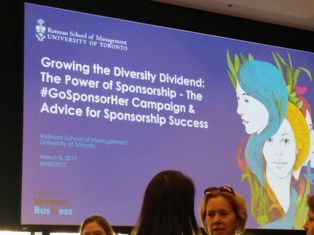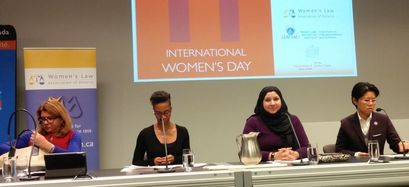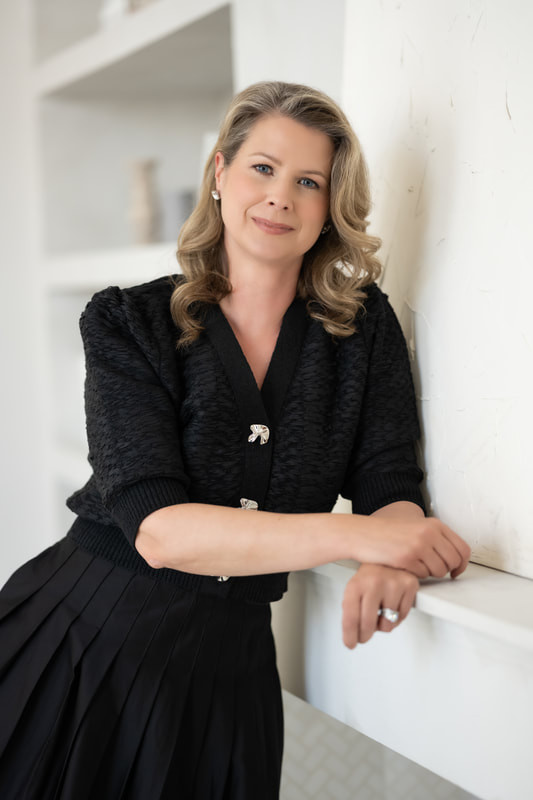 I attended two great events this year for International Women’s Day (IWD - March 8, 2017): one focused on advancing women in the corporate world and the other on advancing women in public service. I left both events feeling energized and hopeful, like I always do listening to brilliant women talking about breaking down barriers and reaching their goals. #GoSponsorHer My first stop was at a breakfast at Rotman School of Management. The topic was “Growing the Diversity Dividend: The Power of Sponsorship – The #GoSponsorHer Campaign and Advice for Sponsorship Success”. I first learned about the #GoSponsorHer campaign and the IWD program on Twitter (if you aren’t on Twitter, join!). #GoSponsorHer is a movement to catalyze sponsorship and increase the number of women in leadership. Participating in this campaign is relatively simple, find a “sponsee” (someone you can sponsor), meet her for lunch or coffee, snap a picture, post it to social media with #GoSponsorHer and challenge 2-3 others to participate as well. The idea being that by making your sponsorship of a woman public, you will be committed to seeing that relationship through. The panel at the Rotman event consisted of Ikram Al Mouaswas (Partner, Deloitte Canda), Megan Anderson (Consultant, McKinsey & Co. & Co-founder of #GoSponserHer), Kirstine Stewart (Chief Strategy Office, Diply), Laura McGee (Consultant, McKinsey &Co and Co-founder of #GoSponsorHer), Bruce Simpson (Senior Partner, McKinsey & Co.), Mark Wiseman (Senior Managing Director, BlackRock), and Miyo Yamashita (Managing Partner, Talent, Deloitte Canada). The moderator was John Stackhouse (Senior Vice-President – Office of the CEO, RBC). First the panel addressed the difference between a mentor and a sponsor, by referring to the common saying that: “A coach talks at you, a mentor talks with you, and a sponsor talks about you”. Ikram however felt that a sponsor should do all three. Kirstine sponsors several women and encouraged the audience to find our own sponsors and to “build a cabinet of people you can draw on on a regular basis”. Laura, as a sponsee, found that it was it important that the relationship was a two-way street and it was imperative to give back to your sponsor. Sometimes it is easier to sponsor a woman outside of your organization, Mark observed (he sponsors Laura), so it doesn’t appear like you are choosing favourites among the people you work with. Ikram commented that a lot of women are afraid to ask for a sponsor or are not sure how to ask. Many may think “Oh my god I am wasting their time”. She encouraged us not to think like this, and to realize that a sponsorship relationship is just as good for the sponsor as it is for the sponsee. It is important, however, that you actually like each other and not every relationship will work out, observed Mark. Kirstine has had to break up with a sponsor and it was like breaking up with her hair-dresser (not a pleasant experience). Megan suggested four steps to find a sponsor: 1) do great work 2) think strategically (what roles in your industry do you aspire to?) 3) make yourself visible to those people (speak up, go to places where they will be, perhaps email with them) and 4) ask! Do you sponsor a woman? Or are you being sponsored? Check out the #GoSponsorHer campaign and consider participating. Law Society of Upper Canada Event: Advancing Women in Public Office The second event I attended was hosted by the LSUC and was co-organized by the Ontario Bar Association’s Women Lawyers Forum, the Women Lawyers Association of Ontario, the Women’s Legal Education and Action Fund (LEAF), and the Barbra Schlifer Commemorative Clinic. The program addressed the following weighty topic: “The prevalence of misogynist and discriminatory language and action in the recent U.S. election campaign reminds us that feminism remains necessary and relevant. The onslaught faced by Hillary Clinton and other women during this campaign is only one example. Canadian women in public life have faced similar abuse.” The discussion was aimed at exploring the barriers women face when running for elected office or engaging in grassroots activism and why more women do not rise to the highest political positions. The program was moderated by Elizabeth Renzetti and the panel consisted of Dr. Tamara Small (a professor of political science at the University of Guelph), Farheen Khan (a Director at the International Development and Relief Foundation and ran as an NDP candidate in the 2015 Federal Election) and Kristyn Wong-Tam (a Councillor with the City of Toronto). Elizabeth immediately hit us with some discouraging numbers: A recent poll found that 60% of Canadians thought that there was the “right number of women in politics” or “too many”. Even though only 25% of the MPs are women and only 18% of mayors are women. 25% of Canadians believe that we will never reach gender parity. Elizabeth also encouraged us to not get too down about these stats and to grab a glass of wine as “bringing down the patriarchy is thirsty work”. Farheen was quite candid about her challenges in running in the federal election as the only candidate who wore a hijab and how she constantly had to prove she was “Canadian” despite being born here. Some people wouldn’t even open their doors to her. Kristyn found knocking on doors was hard for her at first because she found it difficult to use the word “I”. Women tend to find it difficult to talk about themselves. Tamara expressed disappointment at the lack of women running for political office but agreed that politics itself has a “bad rap” and it is a very difficult arena for women to be in, especially, now with the rise of social media and the abuse women face online. Farheen’s team would keep her away from the official social media pages to protect her. A more positive spin on social media came from Kristyn acknowledging that it is just another form of communication and through it you can control your own narrative. She admitted that you are open to more criticism, but this is fine as long as it is fair criticism. As soon as it turns racist, sexist or homophobic Kristyn says her coping mechanism is to “get sleepy”. She can tune it out. All of the panellists were “heartbroken” over the American election. Kristyn was “devastated” but she became resolved and is now dedicated to encouraging and supporting and preparing women to run for public office. Overall the program provided some helpful advice for women considering running for public office. While it will not be easy, we are all responsible to encourage women to run and rise in the political ranks. For some more information on women in politics see my blog on the OBA Women Lawyers Forum’s Pathway To Power event “Women in Politics”. There were so many great events throughout the city and around the world this year for IWD 2017, what event(s) did you attend?
0 Comments
|
Erin C. Cowling is a former freelance lawyer, entrepreneur, business and career consultant, speaker, writer and CEO and Founder of Flex Legal Network Inc., a network of freelance lawyers.
Categories
All
Archives
December 2022
|
|
(C) 2014-2024 Cowling Legal. All rights reserved.
|
Please note I am not currently practicing law.
Information on this website does not constitute legal advice and is for informational purposes only. Accessing or using this website does not create a solicitor-client relationship. See website Terms of Use/Privacy Policy. info@cowlinglegal.com
3080 Yonge Street, Suite 6060 Toronto,ON M4N 3N1 (appointment only) |







 RSS Feed
RSS Feed
